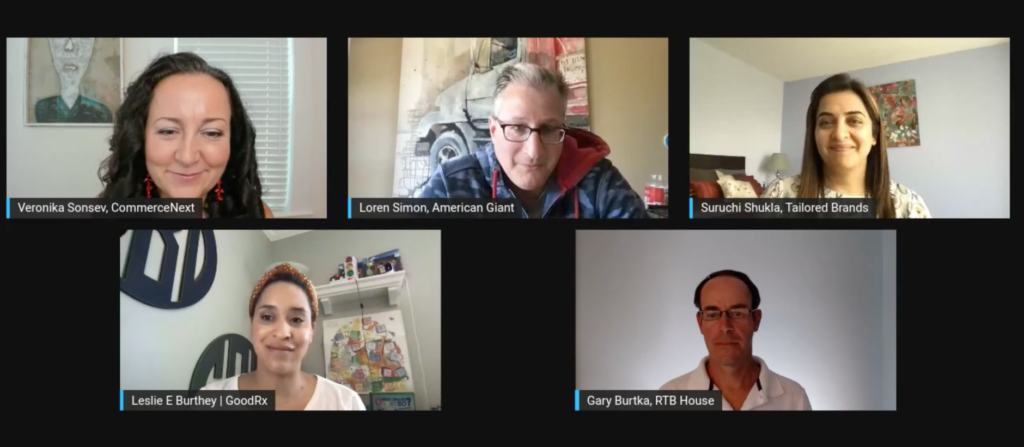With privacy measures doubling down to meet consumers’ increasing needs, our advertising strategies are going to need to adapt. Luckily, our latest webinar covered the best practices your brand can use to both prepare for a cookieless world and improve your advertising strategies while still reaching your target audience. We’re breaking down what Gary Burtka (VP US Operations, RTB House), Suruchi Shukla (VP of Omnichannel Growth Marketing, Tailored Brands), Loren Simon (Chief Revenue Officer, American Giant) and Leslie Burthey (VP of Marketing, GoodRx) had to say on the topic.
Watch the replay here or read the recap below.

[PRESENTATION]
We all need to prepare for a cookieless world, and RTB House has got you covered. Here are their three main recommendations:
- Identity-based methods—In this model, users can still be matched using a unique identifier like email.
- No Identity Methods—This method uses contextual targeting, such as keywords or target categories.
- Group-Based Methods—Includes Chrome’s Privacy Sandbox and Microsoft’s Parakeet.
To maximize the strength of your strategic solution, RTB House recommends using a combination of the three methods listed above.
When are cookies going away?
Google pushed back the depreciation of cookies, so you still have time to prepare. Move fast, though, so you can be ahead of the game. Here’s the timeline you should expect to follow:
- End of 2021—vendors should prepare their working prototypes
- H1 2022—Prototype testing, flood to origin trials, experimental phase
- End of 2022—Prototypes should be complete
- H1 2023—Privacy sandbox could be implemented
- End of 2023—Gradual phase out of 3rd party cookies
There are two different group-based methods that are being created to address privacy concerns: FLoC and FLEDGE.
In a full-funnel marketing strategy, FLEDGE addresses the lower funnel activity, while FLoC engages with new audiences, similar to top of funnel activity.
FLEDGE proposals
FLEDGE uses retargeting, behavioral, contextual and demographic targeting to advertise to existing and potential customers. Two FLEDGE proposals that will still provide personalized ads post-cookies are the Product-Level Turtle Dove and Outcome-Based Turtle Dove. In RTB House’s tests with Google and internal teams, they’ve been able to keep 94.5% efficacy in CTR and 99.98% results in bidding efficacy.
[Q+A PANEL DISCUSSION]
The Effects of iOS Updates
With new iOS updates and websites taking different precautions, brands are experiencing a trial and error of finding new advertising methods to adapt. For example, Tailored Brands shared that their ROAS has decreased by about half since mid-April (when the newest iOS update was released), so they are working to change their spans from retargeting to the strategies that actually work on Facebook.
American Giant recommends taking a step back from being channel specific and shifting perspectives to think about the aggregate pool outcomes—if the whole funnel is still working and giving desired outcomes, then marketers don’t need to be as worried about the specific channel performances.
One big change with iOS 15 is that it will be harder to track open rates because of pixel depreciation in emails. Instead, focus on optimizing your emails for CTR and building your email list with different criteria (or even branch out to different channels like SMS).
Even though many things are changing with technology updates, GoodRx brought up a constant that consumers still want genuine, authentic and helpful content that feels true to your brand.
Moving Towards a Cookieless World
How can your brand prepare for the demise of cookies? Here’s what our panelists had to say:
Build out a robust 1st party data strategy (both data collection and orchestration).
Build CDP to help CRM and social channels.
Move your marketing tactics to channels that can be measured more easily.
Focus on strong attribution tools.
Adapt traditional media channels to improve their tracking + utilize data in a more effective way.
Leaning into traditional channels and developing attribution metrics for those will certainly be a popular tool moving forward. Additionally, brands should focus on brand storytelling, because as it becomes more difficult to track certain channels, rethinking the funnel to focus on developing awareness and consideration will keep you on the right track—even if your other attribution tools are not able to deliver specific metrics.
GoodRx summed it up well: “the cookie is not perfect…going back to thinking about the whole picture and thinking about your marketing mix holistically is going to be important. It was yesterday, it is today and it will be tomorrow.”
Preparing for 1st Party Data
With Google delaying the cookie timeline, there is extra time for brands to prepare. Here’s what our panelists are doing with their time:
- American Giant is thinking about the new emerging players that will be introduced. They predict that in the identity space there will be some new advertising products (likely introduced by payment platforms like Shopify).
- Tailored Brands is taking advantage of the opportunity to do some out of the box thinking to make data collection fun for users, whether that looks like gamifying it or providing an incentive for them.
- RTB House is ahead of the game with their proposals, participating in testing and collecting data to stay ahead.
Moving into a cookieless world may seem daunting, but with these tips shared by our panelists, your brand is sure to find inspiration for your own preparation timeline. As always, stay tuned into CommerceNext webinars and content to hear the latest industry tips and tricks for your marketing strategy.
Related Posts
-
Personalized Engagement — How to Stop Frustrating Your Customers
The CommerceNext webinar, “Personalized Engagement—How to Stop Frustrating Your Customers,”…
-
Storytelling With Video for Deeper Customer Engagement
In the CommerceNext hosted webinar, “Storytelling with Video for Deeper…
-
The Nordstrom Experience: Seamless Integration of Omnichannel Strategies
Nordstrom has become a model of omnichannel success, seamlessly blending…




